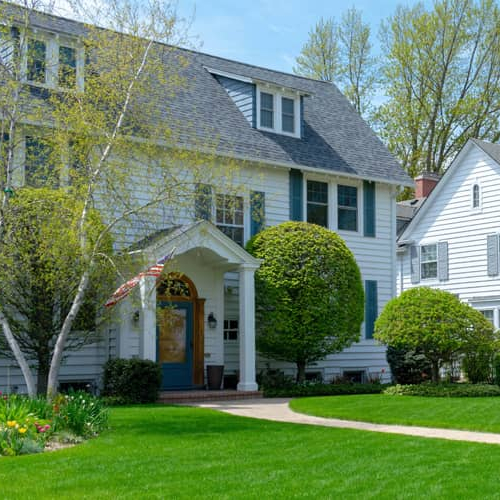How to refinance an FHA loan to a conventional loan
Contributed by Tom McLean
Feb 11, 2026
•6-minute read

If you have an FHA loan, refinancing to a conventional loan may allow you to remove mortgage insurance or reduce your monthly payment. Many homeowners begin by asking, Is a conventional loan better than FHA? Learn if it's right for you to refinance FHA to conventional, how the process works, and the pros and cons to consider.
Can you refinance an FHA loan to a conventional loan?
Yes, if you have an FHA loan, you can refinance to a conventional loan. Refinancing may shorten your loan term, take advantage of lower interest rates, and help you enjoy lower monthly payments.
Why refinance from an FHA mortgage to a conventional loan?
Below is a simple comparison to help you understand the difference between FHA and conventional loans. This shows how each loan type affects your ability to build home equity.
| Feature | FHA loan | Conventional loan |
|---|---|---|
| Minimum down payment and credit score | Rocket Mortgage requires a 3.5% down payment with a credit score of at least 580.1 Other lenders may require 10% down with a credit score between 500 and 579. | Fixed-rate loans require at least 3% down2, while adjustable-rate mortgages (ARM) need 5% down. No minimum credit score required, though your credit is reviewed. |
| Loan terms available | Commonly 15- and 30-year terms | Wide range: 10-, 15-, 20-, 25-, and 30-year terms |
| Rate options | Available in both fixed-rate and ARM options | Available in both fixed-rate and ARM options |
| Mortgage insurance | Must pay up-front MIP at closing and annual MIP for life of loan with down payment of less than 10%, or 11 years with 10% or more down. | PMI required with a down payment of less than 20%. PMI can be canceled once 20% equity is reached. |
Pros and cons of refinancing from an FHA to a conventional loan
Refinancing has several potential benefits and drawbacks.
Pros
Advantages to refinancing from an FHA to a conventional loan include:
- Lower interest rates. Refinancing gives you a new mortgage interest rate. Conventional rates can be slightly higher than FHA rates, but you may still secure a lower rate if market conditions have improved. A lower rate can save thousands over the life of the loan.
- You can save on mortgage insurance. FHA loans require borrowers to pay an up-front and an annual mortgage insurance premium (MIP). The annual MIP must be paid monthly for the entire loan term with a down payment of less than 10%, or for 11 years with a down payment of 10% or more. Even if you have to pay private mortgage insurance (PMI) on your conventional loan, you can cancel it once you have 20% equity, which can save you money compared with MIP.
Cons
Here are some risks of refinancing an FHA loan to a conventional mortgage:
- You must pay closing costs. Refinancing from an FHA loan to a conventional loan can save you money, but it comes with closing costs. These typically range from 3% to 6% of the loan amount. You'll want to calculate your break-even point to see how long it will take for your savings from refinancing to recoup your closing costs and fees.
- Repeat the loan approval process. Refinancing requires a complete mortgage application and approval process. This includes another credit pull, documentation updates, and possibly another appraisal. Lenders often require recent pay stubs, proof of homeowners insurance, tax forms, and a new lender’s title insurance policy.
How to refinance your FHA loan to a conventional mortgage
Here’s what to expect when refinancing your FHA loan to a conventional mortgage.
Step 1: Do your research
Before you apply, compare your borrowing options. A rate-and-term refinance lets you adjust your interest rate, loan term, or both. A cash-out refinance allows you to borrow your home equity if you need funds for significant expenses.
Compare interest rates, loan terms, and your potential monthly payment. Asking yourself some key questions can help you choose a lender.
Step 2: Prepare your documentation
Refinancing requires many of the same documents you provided when you first applied for a mortgage. It can help to gather in advance:
- W-2s or 1099s
- Recent pay stubs
- Bank statements
- Homeowners insurance information
- Income tax returns
Step 3: Meet refinancing requirements
Before you refinance, make sure you can meet conventional loan requirements.
Here’s what Rocket Mortgage requires:
- 50% maximum debt-to-income ratio (DTI)
- 95% maximum loan-to-value ratio (LTV)
- Proof of income
- Homeowners insurance verification
- Appraisal of the home or the equivalent of one to determine your home value
Step 4: Apply and go through underwriting
Underwriting begins after you apply and submit documentation. A loan officer evaluates your finances and the property being refinanced.
In addition to reviewing your credit and income, an appraisal requirement must be met to confirm that your home value supports your goals. Your loan officer may review the title.
You will receive a Closing Disclosure outlining the final terms and costs of the mortgage refinance at least 3 days before closing. This includes a final estimate of your loan terms and closing costs.
Step 5: Finish the closing process
Finally, you'll complete the refinance closing, as you did when you took out your original mortgage loan. You'll review and sign the documents for your new conventional loan.
Other FHA refinancing options
If a conventional refinance isn't the right fit, there are FHA refinancing options. Each has advantages and considerations, so choose the one that fits your long-term plans.
- FHA Streamline refinance3: This rate-and-term option simplifies refinancing with less documentation and often no appraisal requirement. It can lower your monthly payment or interest rate with minimal paperwork.
- FHA cash-out refinance4: This option allows you to turn some of your home equity into cash for major expenses like home improvements, tuition, or debt consolidation. It requires a credit review and an appraisal, but it can help if you need cash.
As you prepare to refinance, it helps to compare potential monthly payments and overall savings. Estimate new payment scenarios using the refinance calculator and review the cost to refinance to understand what goes into closing costs.
FAQ
Below are answers to common questions about refinancing from an FHA loan to a conventional loan.
Can I switch from an FHA loan to a conventional loan before closing?
It’s possible, but you’ll need to start a new loan application. Your lender will need to verify that you meet the credit score, income, and documentation requirements for a conventional mortgage.
When should I refinance my FHA loan to a conventional loan?
Refinancing to a conventional loan may make sense if your credit has improved, interest rates are lower, you want to remove MIP, or you plan to stay long enough to recover closing costs.
Can you refinance an FHA loan to get rid of MIP?
Yes, one potential benefit of refinancing an FHA loan to a conventional loan is eliminating MIP. If you refinance with more than 20% equity, you won't have to pay PMI.
The bottom line: Know your options before refinancing
Refinancing from an FHA loan to a conventional loan can help you reduce mortgage insurance, lower your interest rate, or adjust your monthly payment. Understanding conventional loan requirements and the pros and cons helps you make a choice that supports your long-term financial stability.
If you’re considering a refinance, speak with a Home Loan Expert at Rocket Mortgage to explore your options.
1 To qualify for this offer, you must meet all standard FHA eligibility requirements. In addition, your total mortgage payment, including taxes and insurance, cannot exceed 38% of your income, your debt-to-income (DTI) ratio cannot exceed 45%, and you must have 12 months of verifiable housing history immediately prior to your application, no late payments 30 days or greater in the last 12-months, and no derogatory marks on your credit report. Not available on jumbo loans. Asset statements may be needed, no more than 1 day of non-sufficient fund fees are allowed in the most recent 2 months prior to application. Additional restrictions/conditions may apply.
2 The 3% down payment option is only available on certain conventional loan products and is not available in all states. Additional terms and conditions may apply.
3 The FHA Streamline program may have stricter requirements in some states. In order to qualify for the FHA Streamline program, an immediate .5% minimum reduction in interest and mortgage insurance premium is required. Some states may require an appraisal.
4 Refinancing may increase finance charges over the life of the loan.
Rocket Mortgage is a trademark of Rocket Mortgage, LLC or its affiliates.

Sam Hawrylack
Samantha is a full-time personal finance and real estate writer with 5 years of experience. She has a Bachelor of Science in Finance and an MBA from West Chester University of Pennsylvania. She writes for publications like Rocket Mortgage, Bigger Pockets, Quicken Loans, Angi, Well Kept Wallet, Crediful, Clever Girl Finance, AllCards, InvestingAnswers, and many more.
Related resources

7-minute read
Refinancing your mortgage: Requirements explained
Refinancing your home has its benefits, but there are conditions to meet before you apply. Use this guide to understand mortgage refinance requirements.
Read more

6-minute read
Refinance appraisal vs. purchase appraisal
Preparing for a refinance appraisal or purchase appraisal? Learn the differences between refinance vs. purchase appraisals, how they work and your options.
Read more

8-minute read
11 questions to ask when refinancing your mortgage
Thinking about refinancing your mortgage? Get the best refinance for your borrowing needs by asking these questions before making a decision.
Read more